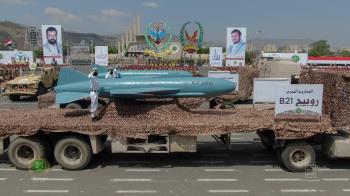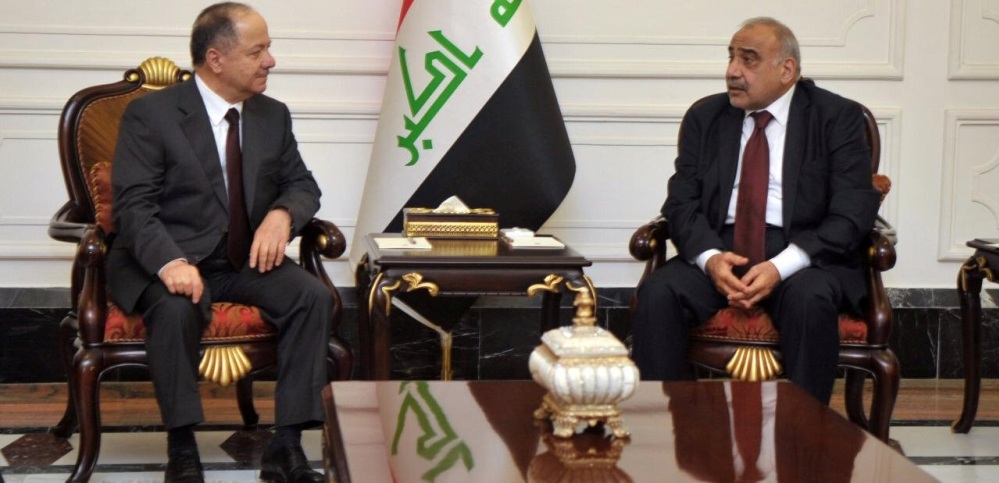Alwaght- After a nightmarish year in the Kurdish region’s relations with the central Iraqi government which followed the independence referendum organized by some Kurdish sides, Baghdad and Erbil appear to see the ground prepared to normalize their ties in the post-parliamentary election period.
The most apparent signal of the improving ties may be was sent by the visit to Baghdad by Masoud Barzani, the former president of the Kurdistan Regional Government (KRG) and the leader of the Kurdistan Democratic Party (KDP) on Thursday and the meeting with the officials there, on top of them the new Prime Minister Adel Abdul Mahdi.
Barzani as the architect and implementer of the referendum plan was subject to the highest level of criticism and fury directed from the politicians in the Iraqi political community, with many figures even demanding his trial under charges of violation of the Iraqi sovereignty and constitution.
After calm returned to Baghdad-Erbil relations, mainly following the recapture of the oil-rich Kirkuk by the central government from the Kurds and formation of a new government in Baghdad, the Kurdish leader, apparently carrying important messages, had traveled to meet the Iraqi leaders. The trip to Baghdad is of high significance because despite his step-down from power after 12 years, Barzani remains the behind-the-scenes decision maker in the autonomous region. Four factors drive this visit:
A new page in Erbil-Baghdad relations
The first aspect of the visit’s importance in the present conditions is the possibility of the start of a new period in the relationship between the Kurds and Baghdad. A cloud of gloom covered their bilateral relations after the split plebiscite was organized on September 25 by Masoud Barzani despite warnings by the central government, regional powers, and even international sides. At the time, there was the possibility of clashes between them. After about 14 months of the separatist move, Barzani’s visit can open a new page in their bilateral relationship. It can be read as a final move by Erbil leader to show a readiness for de-escalation.
Certainly, the negotiations with the new PM will open new courses of the interaction of the Kurds with the central government, with the results to show themselves in the upcoming months.
Seeking a solution to disputes with Baghdad
During the meeting of Barzani with Baghdad officials, the main focus was the discussion of the disputes between the two sides that have been accumulated since 2003. The sticking points that were possibly discussed range from the control of the “disputed regions”, the KRG’s share from the Iraqi national budget, and Erbil’s independent moves in oil production and exportation as well its economic and security ties foreign parties, none of which authorized by Baghdad. Now, the hope of settling these issues exceeds any other time. That is because the Kurds have lost their grip over some parts of the disputed regions, including Kirkuk, to Baghdad as the latter responded to referendum by sending troops to Kirkuk. With their hands empty from bargaining chips, the Kurds are now open to compromise and backing down on their once-stiff positions. Last week, after a year-long halt, oil exports from Kirkuk to the Turkish port of Ceyhan resumed under central government’s control.
Barzani’s KDP seeks a full exit from the crisis
Over the past year, the regional government put itself in dire political and economic straits when it made the strategic mistake of holding the secession referendum that failed to meet its goal and only ended in a humiliating fiasco. Things went to bad for Erbil that the autonomous even risked losing its autonomy for some time. KDP, with his leader Barzani, as the main architect of the secessionist move, underwent heavy pressures from inside and outside. Many voices inside the northern Iraqi region found the critical conditions they lived in a result of the KDP ambitions for the split. In the middle of all this, the Iraqi parliamentary election, as well as the local parliament election in the Kurdish region, appear to have given the KDP a chance to mend its largely damaged image and move out of the crisis.
Barzani's party leads the other Kurdish parties in the Iraqi parliamentary election with 25 seats. It also holds the three other seats belonging to the minorities. In the local parliamentary election, on the other hand, the KDP secured 45 independent seats and 11 minority seats to come on top in the 111-seat local parliament. The party even secured 50+1 seats, the threshold needed to form a government. With this political weight gained, the KDP wants to retake the region’s budget from Baghdad to end the economic crisis. It intends to get the credit for the improvement of the situation.
Barzani’s symbolic support for Abdul Mahdi government
Another drive for Barzani visit is related to his aim to show backing for PM Abdul Mahdi government’s sustention. So far, the new PM was brought under pressure for his minister choices. The PM has tacitly threatened the political factions with resignation once they decide to ramp up pressures on him or intervene in his minister picking. Barzani, as a figure with strong opposition to Haider al-Abadi, the former PM, remaining in power, and supporter of Abdul Mahdi’s premiership seeks to symbolically throw his weight behind the new PM.



























